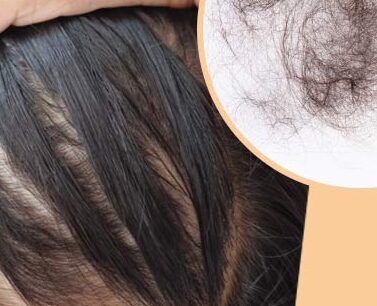All you need to know about your hair loss!
How your hair grows?
Your hair is made of keratin (KER-uh-tin), the same protein that makes up your nails and the outer layer of your skin. The part you see and style is called the hair shaft. It’s actually dead tissue made by your hair follicles tiny bulb-like structures beneath your scalp’s surface.
We have all heard of someone who has thinning hair problem, but do we really know how extensive this thinning hair problem is? Let us take a look at the figures here..
1. By age 65, 48% of all women report they have thinning hair and 75% of all men report they have noticeably thin-looking hair.
2. Research has shown that the problem of thin-looking hair can begin as early as age 17.
3. The problem will grow more extreme as our population ages.
How does hair loss start?
Hair loss is a normal symptom. 50 to 60 hairs are shed each day from a normal scalp. Losing more than 60 hairs a day is called excessive hair loss and leads to generalized thinning of the hair. Hair becomes fine in texture. Loss of hair in men is often determined by heredity or by the Allopetia Androgenetic hormone. Hair loss in women is often caused by pregnancy, stress, fatigue or medical treatment.
Can Thyroid Disease Cause Hair Loss?
An overactive or underactive thyroid can cause hair loss. One may get her thyroid numbers in order after beginning a regimen of thyroid medication. However, there have been reported cases of women experiencing hair loss FROM the thyroid medication.

Deficiency and Hair Loss!
Protein
The deficiency of protein (either intake or absorption) being low can cause severe hairfall.As we know protein is the building block of a cell and our hair needs it as much as our muscles.
Iron
Iron deficiency can lead to severe hairfall as iron helps red blood cells to carry oxygen to the whole body. If iron is low then oxygen is not delivered enough resulting in hair fall, fatigue, brittle nails and dark circles.
Zinc
Zinc helps in protein synthesis. People with digestive issues have low zinc absorption leading to hairfall.
Vitamin C
Vitamin C helps iron absorption. It is a powerful antioxidant which helps reduce the oxidative stress on the hair follicles.
Vitamin D
Vtamin D promotes cell growth, stimulates old and new hair follicles.
Selenium
Selenium is a trace mineral that is required for hormone balancing which inturn promotes hair growth.
Vitamin E
Vitmain E like C is a antioxidant that reduces oxidative stress.
Biotin and Niacin
Vitamin B ( Biotin and Niacin) helps promote protein synthesis and enhances cell growth.
Other important nutrients like fatty acids( omega 3), folic acid and Vitamin A are all equally important. A balanced diet that contain all the essential nutrients can help reduce hair fall, promote hair growth, strengthens the hair and improves texture.